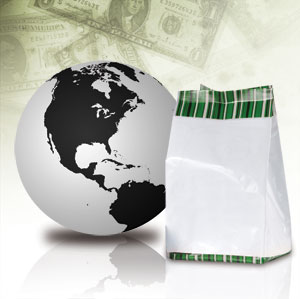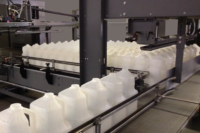With a few exceptions, including notably Amcor and Sealed Air, most of these companies continue to operate at a national or regional market level although there is plenty of evidence of others following their multinational brand owner customers and pursuing a global strategy via acquisition and/or green field investment. Important examples include Bemis and Ampac in the U.S. and Huhtamaki in Europe.

|
| The top 20 global converters are now estimated by PCI to account for around 40 percent of the world converted flexible packaging* market valued at around $74 billion in 2012. |
A Strong Presence for Private Equity
More recently, it has been the private equity firms that have been playing an increasingly important role in driving industry consolidation. This is especially the case in North America and Europe, where around one-third of the top 20 flexible packaging converters, and a host of smaller players, are now owned by private equity firms. Companies in the packaging industry are regarded as attractive prospects for strategic and equity buyers, serving as they do broadly non-cyclical industries such as food and pharmaceuticals.
New York-based JP Morgan Chase & Co’s private equity arm One Equity Partners is one such company shaping and consolidating the flexible packaging industry. Globalpack, one of Mexico’s leading flexible packaging converters and Austria-based Constantia Flexibles’ were both active in the North American market but neither were able to challenge the main players. However, after One Equity bought them in 2007 and 2010 respectively, their combined value-added flexible packaging sales in the region are now topping $300 million per annum.
In January, the two businesses were brought together with the completion of Constantia’s acquisition of Globalpack. The move will significantly strengthen Constantia’s position in the North American flexible packaging market and rank it alongside converters such as Bryce, Prolamina, Sonoco, Amcor and American Packaging, each commanding around 2 percent market share in the region.
Neither operation could have done it on their own but with One Equity’s backing, a new force in flexible packaging in North America has been established and one with a commanding footprint in Europe as well.
*PCI defines ‘Flexible Packaging’ as embracing the manufacture, supply and conversion of plastic and cellulose films, aluminium foils and papers that are used separately or in combination, for primary retail food packaging, non-food packaging applications such as pet food, DIY products, hygiene product overwrap, household detergents, tobacco and certain other specialist non-food packaging end-use sectors especially medical products and pharmaceuticals. As such, PCI’s definition relates specifically to value-added primary flexible packaging and excludes industrial packaging applications and unconverted commodity films.
Want to take an in-depth look at the North American Flexible Packaging Market? Go to packstrat.com/studies to check out the market study on the North American Flexible Packaging Market and to see our complete list of studies.


